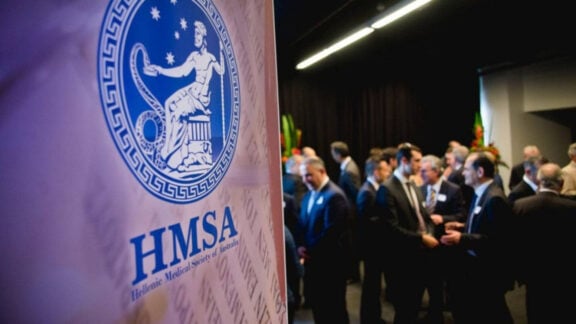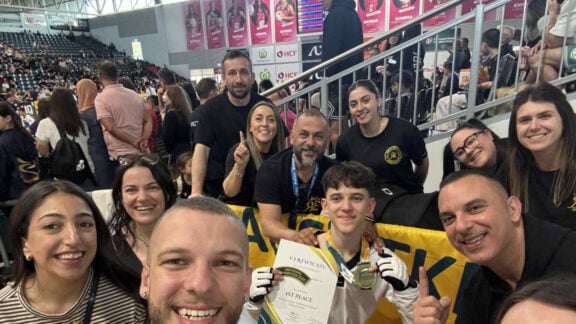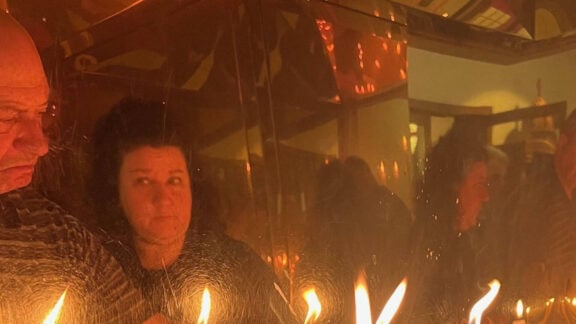A delegation from Greece has arrived in Australia to discuss migrants living in Greece, including Turks who have moved there due to Turkish president Recep Tayyip Erdogan’s heavy-handed rule. The delegation has met parliamentarians and key ethnic lobby groups in in Sydney and will also deliver a forum in Melbourne.
The delegation consists of Katerina Markou, a former member of parliament for Thessaloniki –initially with the Democratic Left and later Potami and then with New Democracy, who now directs Papazisis Publishing, a leading educational and academic publisher; Dr Ioannis E. Kotoulas, an adjunct lecturer in Geopolitics at the University of Athens who researches geopolitics, international security, and modern Hellenism; journalist Georgia Lagou, who covers the maritime and has reported from Ukraine and Hasan Kotsantzi, a law graduate from Selçuk University, an expert in media, who consults on education and social integration dialogue in Greece.
Efforts to bridge Greek-Turkish relations through their diasporas
Ahmet Keskin the executive director of the Australian Intercultural Society (AIS) and co-founder of Affinity Intercultural Foundation (AIF), along with aligned organisations, is hosting the event.
Keskin wants to augment understanding between Turks and Greeks through the official Dialogue Networks.
“We’ve got an aligned Dialogue organisation in Athens, and they do a whole series of things like us.
“Greece is a first point of entry for a lot of the Hizmet (Gülen) movement, and others leaving Turkey,” Keskin said to Neos Kosmos.
“Those who flee Turkey, can through the Dialogue network, meet people in Greek society to settle into their new land.”

Keskin is part of the Hizmet, or Gülen movement – a movement that promotes civic society, but has fallen out of favour with an increasingly authoritarian Turkish president, Erdogan.
The Hizmet movement has been persecuted and politicians, academics, businesspeople, journalists, and teachers have been jailed, or forced into exile after the 2016 attempted coup, which Erdogan blames on the movement.
A reason Keskin is hosting the delegation is “to break away from that old prejudice that Greeks and Turks don’t seem to get along together.”
“Greek Society is helping Turks seeking refuge, and their hospitality expands beyond the Turkish community because, as we know, Greece is an entry point for many people fleeing their countries.”
“They’re not political refugees in that classic sense – they’re members of the Hizmet movement, a civil society movement.
“Erdogan is going after anyone who does not obey his command. The movement has been Public Enemy number one.
“Life has become very difficult for them in Turkey,” Keskin said.
“Many of the Hizmet movement have been put in prison and those who don’t want to have time in prison are seeking to flee, and where else can you flee but start from Greece.”

Greece is the gateway to Europe, and while many Turks then move on to Germany or Holland, where they have extended family, others make a new life in Greece.
Keskin believes that Australia is a great example of how the diasporas, from Greece and Turkey can work together.
“It’s an opportunity to exchange views and perspectives and some experiences as to what has happened in Greece, with delegations talking about what they’ve done to extend their hospitality and help people,” Keskin said.
He also wants to show that “we have good friends and good relations with our Greek friends”.
Keskin has not been back to Turkey since 2015, and “won’t be able to go back for a while”.
“I want things to change, starting with a change of government and the mood of the people.”
He is a “cautious optimist” and said that it will take a bit of time, it requires effort, to build trust and respect within Turkey and then Turkey looking out”.
“Once upon a time, Turkey was seen as a bridge between the East and West.
“It just shows that when power goes into the wrong hands, things can go off-kilter, which is what’s happening right now.”
Many professionals, intellectuals, entrepreneurs, businesspeople, tech people, and the creative class have left Turkey in the last 20 years creating a real brain drain.

Greece’s approach to Turks fleeing Erdogan’s rule
Katerina Markou told Neos Kosmos, that “many Turks have come [to Greece] and we have given them political asylum.”
“These Turks send their children to the same public schools as ours, and we provide them with full access to health care and they have the same rights as Greek citizens,” Markou said.
The former politician, now publisher, wants to see how Australia develops multicultural practices especially in terms of multicultural education at schools.
Those fleeing Erdogan’s rule, “are middle class, educated people, and especially the women,” Markou told Neos Kosmos.
“Many of the Turkish women seeking asylum in Greece are teachers, and diverse professionals.
She said a “woman who is a speech therapist”, has been “in Greece for many years now”.
“Many of the men are also professionals or entrepreneurs who have opened restaurants, pastry shops, and run telephony shops and technology retail,” Markou said.
In 2016 when these Turkish people came in, “Greece was not prepared” Markou said.
“Our schools suddenly had an influx, and were not dealing with it, and we need more multicultural schools – the current ones cannot absorb so many people because we are talking about a very large community at the moment,” the former politician said.
Emigres are part of Turkey’s wealth and brain drain
Markou points to four categories of people “who have come to Greece since the 2016 coup attempt.”
“The first category of asylum seekers were the wealthy, who took advantage of Greece’s Golden Visa.
“With 250,000 euros you could purchase a Golden Visa, now the amount has gone up to 400,000 euros –you could also move around Europe without the need for country visas, something these people couldn’t do as Turks, coming from a third country.”
The second category Markou said was Gulenists chased out out by authorities, or who can no longer get a job in the system due to their beliefs.
“They [Gulenists] came mainly by crossing the river, the sea, or through the Evros, there are around 3000 people, now mostly in Kallithea, in the old Faliro.”
The third category was “Kurds with left-wing convictions, who left after the coup, they and the old secular Turkish Kemalists” – many of who are “university professors” and intellectuals said Markou.
The fourth category are young tech-savvy people “25 to 30 years old who work at Apple and Google” in Greece.
“They [Turkish emigres] are all more comfortable culturally in Greece because we are Europe and still have an Eastern cultural feel,” Markou said.
She adds that “Greece is a free country and other European nations have failed on immigration.
“This is evident by the election results that Europe has become xenophobic, and there are many racist incidents in Europe, yet Greece is a safe country, because we do not have those incidents anymore,” Markou said.
In Sydney the delegation met with Sophie Cotsis Minister for Industrial Relations at the NSW Parliament. In Melbourne the delegation will meet with the ASRC’s director Kon Karapanagiotidis and Justice Emilios Kyrou. The Parliamentary Friends of Greece will host the guests at the Victorian parliament, and a lunch will be held at the University of Melbourne by Dr Andonis Piperoglou, head of Diaspora studies.
There will be an ADI Policy Forum titled – Immigration and Refugee Policies at the Crossroad at Deakin Downtown at 727 Collins Street tower 2 level 12 Melbourne – on Thursday, September 5 at 3pm.









